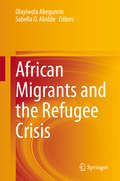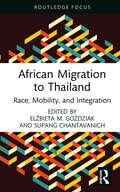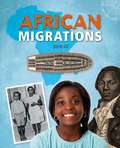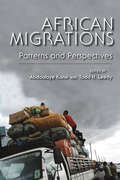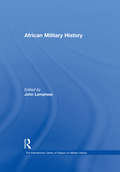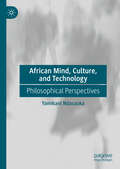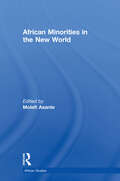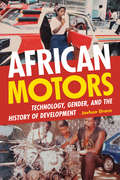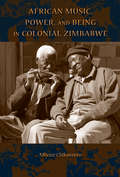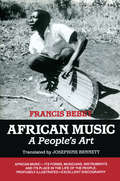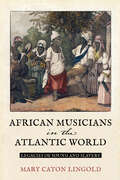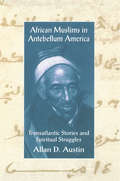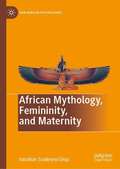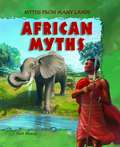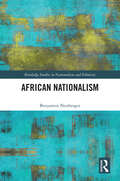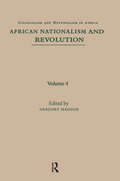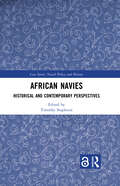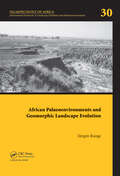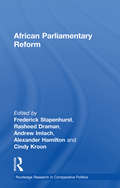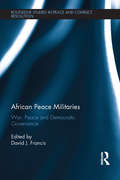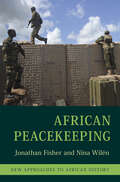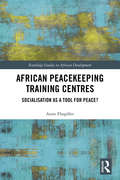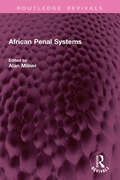- Table View
- List View
African Migrants and the Refugee Crisis
by Olayiwola Abegunrin Sabella O. AbiddeThis book discusses African migration and the refugee crisis. Economic, political and social tension in the Middle East and in many parts of the Global South has induced historic mass migration across national and international borders. The situation is especially dire in Africa, where a sizable number of Africans have chosen or have been forced to leave their countries of origin for Europe and North America. Written by an international team of scholars, this edited book traces the refugee crisis around the world, telling the necessary story of forced migration, intentional exclusion, and human insecurity from an Afrocentric lens. The volume is divided into three sections. Section I places African migration within the broader contexts of international history, law, economics, and policy. Section II discusses cases of African migration to Europe, Latin America, and the Mediterranean. Section III considers negative consequences of mass African migration, including the restriction and criminalization of migration, post-traumatic stress disorder, and gender-based violence. A compelling account of risk, resilience, and global power dynamics, this volume will be useful to students and researchers interested in African studies, migration, peace and conflict studies, and policy as well as professionals, practitioners, NGOs, IGOs, governmental and humanitarian organizations.
African Migration to Thailand: Race, Mobility, and Integration (Routledge Series on Asian Migration)
by Elżbieta M. Goździak and Supang ChantavanichThis book, based on exploratory ethnographic research, analyzes the experiences of African migrants in Thailand. Thailand has always been a regional migration hub with Africans being the most recent. Sitting at the intersection of race and migration studies, this book focuses on the challenges Black and labor migrants face trying to integrate into a society that has had very limited contact with and knowledge about Black Africans. Bringing together research from African, Thai, and European scholars, this volume focuses on forced migrants, such as Somali asylum seekers, and labor migrants, largely African men seeking better livelihoods in niche economies such as gem trading, garment wholesale, and football playing and coaching. The book also includes theoretical contributions to the understanding of precarity and human security, the concept of in/visibility to analyze the challenges African migrants face in Thailand as well as the concept of othering to understand discrimination against Africans. The book also analyzes the Thai migration policy context and the challenges facing Thai policy-makers, law enforcement representatives, and the migrants themselves. While not comparative in nature, this volume directly connects with studies of Africans in other parts of Asia, especially China. Addressing an important gap in migration research, this book will be of interest to researchers across the fields of migration and mobility studies, African Studies, and Asian Studies.
African Migrations
by Hakim AdiDiscover the fascinating history of African migration, from thousands of years ago to the 21st Century.Newly updated, African Migrations explores the history of migration from Africa, from the forced migrations of slavery and the experiences of life in the Americas to the political and economic migrations of more recent times. Experiences are brought to life with case studies of children from the 20th and 21st centuries.Written by British historian and academic Hakim Adi, Profressor of the History of Africa and the African diaspora at the University of Chichester, this book is essential reading for children aged 11+ and anyone interested in learning about African migrations.
African Migrations: Patterns And Perspectives
by Todd H. Leedy Abdoulaye KaneSpurred by major changes in the world economy and in local ecology, the contemporary migration of Africans, both within the continent and to various destinations in Europe and North America, has seriously affected thousands of lives and livelihoods. The contributors to this volume, reflecting a variety of disciplinary perspectives, examine the causes and consequences of this new migration. The essays cover topics such as rural-urban migration into African cities, transnational migration, and the experience of immigrants abroad, as well as the issues surrounding migrant identity and how Africans re-create community and strive to maintain ethnic, gender, national, and religious ties to their former homes.
African Military History (The International Library of Essays on Military History)
by John LamphearThis collection of essays on pre-colonial sub-Saharan African military history is drawn from a number of academic journals and includes some which are considered milestones in African historiographical discourse, as well as others which, while lesser known, provide remarkable insight into the unique nature of African military history. Selections were made so as to produce an introduction to the understudied field of pre-colonial African military history that will be useful to specialists and non-specialists alike. The volume also contains an introduction which presents one of the first significant reviews of pre-colonial African military historiography ever attempted.
African Mind, Culture, and Technology: Philosophical Perspectives
by Yamikani NdasaukaThis book provides a philosophical investigation of technology in Africa, articulating conceptual foundations and analyses rooted in African worldviews and communitarian values. It aims to spur discourse and understanding of how technology can be justly shaped for human advancement in Africa. Yamikani Ndasauka highlights the need to understand African conceptions of existence, ethics, and values as foundations for envisioning more humanistic technological applications. A historical contextualisation traces the layered origins of African technology philosophy in indigenous innovation, resistant adaptation of external systems, and creative fusion of endogenous and exogenous knowledge. The book develops African frameworks to assess and design technology in accord with human dignity and collective advancement.
African Minorities in the New World (African Studies)
by Toyin Falola Niyi AfolabiThis book uncovers the reality that new African immigrants now represent a significant force in the configuration of American polity and identity especially in the last forty years. Despite their minority status, African immigrants are making their marks in various areas of human endeavor and accomplishments—from academic, to business, to even scientific inventions. The demographic shift is both welcome news as well as a matter for concern given the consequences of displacement and the paradoxes of exile in the new location. By its very connection to the ‘Old African Diaspora,’ the notion of a ‘New African Diaspora’ marks a clear indication of a historical progression reconnecting continental Africa with the New World without the stigma of slavery. Yet, the notion of trans-Atlantic slavery is never erased when the African diaspora is mentioned whether in the old or new world. Within this paradoxical dispensation, the new African diaspora must be conceived as the aftermath of a global migration crisis.
African Motors: Technology, Gender, and the History of Development
by Joshua GraceIn African Motors, Joshua Grace examines how Tanzanian drivers, mechanics, and passengers reconstituted the automobile into a uniquely African form between the late 1800s and the early 2000s. Drawing on hundreds of oral histories, extensive archival research, and his ethnographic fieldwork as an apprentice in Dar es Salaam's network of garages, Grace counters the pervasive narratives that Africa is incompatible with technology and that the African use of cars is merely an appropriation of technology created elsewhere. Although automobiles were invented in Europe and introduced as part of colonial rule, Grace shows how Tanzanians transformed them, increasingly associating their own car use with maendeleo, the Kiswahili word for progress or development. Focusing on the formation of masculinities based in automotive cultures, Grace also outlines the process through which African men remade themselves and their communities by adapting technological objects and systems for local purposes. Ultimately, African Motors is an African-centered story of development featuring everyday examples of Africans forging both individual and collective cultures of social and technological wellbeing through movement, making, and repair.
African Music, Power, and Being in Colonial Zimbabwe
by Mhoze ChikoweroIn this new history of music in Zimbabwe, Mhoze Chikowero deftly uses African sources to interrogate the copious colonial archive, reading it as a confessional voice along and against the grain to write a complex history of music, colonialism, and African self-liberation. Chikowero's book begins in the 1890s with missionary crusades against African performative cultures and African students being inducted into mission bands, which contextualize the music of segregated urban and mining company dance halls in the 1930s, and he builds genealogies of the Chimurenga music later popularized by guerrilla artists like Dorothy Masuku, Zexie Manatsa, Thomas Mapfumo, and others in the 1970s. Chikowero shows how Africans deployed their music and indigenous knowledge systems to fight for their freedom from British colonial domination and to assert their cultural sovereignty.
African Music: A People's Art
by Francis BebeyEngaging and enlightening, this guide explores African music's forms, musicians, instruments, and place in the life of the people. A discography classified by country, theme, group, and instrument is also included.
African Musicians in the Atlantic World: Legacies of Sound and Slavery (New World Studies)
by Mary Caton LingoldMusic, that fundamental form of human expression, is one of the most powerful cultural continuities fostered by enslaved Africans and their descendants throughout the Americas. The roots of so much of the music beloved around the world today are drawn directly from the men and women carried across the Atlantic in chains, from the west coast of Africa to the shores of the so-called New World. This important new book bridges African diaspora studies, music studies, and transatlantic and colonial American literature to trace the lineage of African and African diasporic musical life in the early modern period.Mary Caton Lingold meticulously analyzes surviving sources, especially European travelogues, to recover the lives of African performers, the sounds they created, and the meaning their musical creations held in Africa and later for enslaved communities in the Caribbean and throughout the plantation Americas. The book provides a rich history of early African sound and a revelatory analysis of the many ways that music shaped enslavement and colonization in the Americas.
African Muslims in Antebellum America: Transatlantic Stories and Spiritual Struggles
by Allan D. AustinA condensation and updating of his African Muslims in Antebellum America: A Sourcebook (1984), noted scholar of antebellum black writing and history Dr. Allan D. Austin explores, via portraits, documents, maps, and texts, the lives of 50 sub-Saharan non-peasant Muslim Africans caught in the slave trade between 1730 and 1860. Also includes five maps.
African Mythology (Mythology Around The World Ser.)
by Sandra GiddensAfrican mythology is as vast as the African continent itself. The myths of Africa vary from country to country and have been passed down orally through a strong communal tradition. Readers learn exactly what mythology is, why it is so important to cultures, and how the mythology ties in to Africa s history.
African Mythology, Femininity, and Maternity (Pan-African Psychologies)
by Ismahan Soukeyna DiopThis book explores feminine archetypes and mythological figures in African and European traditions with an underlying goal of describing the foundations of social status for women. The author provides a rich corpus of mythology and tales to illustrate aspects of female and mother-daughter relationships. Diop analyzes the symbolic aspects of maternity and femininity, describing the social meaning of the matrix, breasts, and breastfeeding. A retrospective of female characters in African literature brings an interesting approach to explore the figures of femininity and maternity in society. After an extensive analysis of African mythology and tales, the author proposes a way to integrate them in the clinical psychotherapy as a projective material. The analysis of clinical cases offers an example of how this material can be used in therapy with women from African descent.
African Myths (Myths From Many Lands)
by Neil Morris Graham KennedyReaders learn the mythological explanations of how the universe was created, the sun was stolen, and how a spider gained the world's collection of stories.
African Myths and Legends (World Books Myths and Legends)
by Philip ArdaghA collection of traditional tales from Africa, reflecting the cultures and religions from which the stories come.
African Nationalism (Routledge Studies in Nationalism and Ethnicity)
by Benyamin NeubergerAfrican Nationalism offers an innovative perspective on the creation of nations and nationalism, and the role of race in nationalism overall, by bringing together a compilation of debates on African nationalism, from Pan-Africanism up to the present day. The book examines African nationalism in comparative perspective, mainly with the UK, France, and the US: the birthplaces of modern nationalism. The author suggests that the origins of African nationalism lay outside the continent and demonstrates the similarities that abound between African nationalisms across a diverse range of countries. This volume is important reading for students and scholars of nationalism, history, political science, and African studies.
African Nationalism and Revolution (Colonialism And Nationalism In Africa Ser. #Vol. 4)
by Gregory MaddoxThe study o f African history as an academic discipline is a rather new field and one that still has its detractors both w ithin and outside academics. This collection o f articles highlights for students and scholars the modern era in African history. It brings together published research on the colonial era in Africa, an era relatively brief but one that sawdramatic change in African societies.
African Navies: Historical and Contemporary Perspectives (Cass Series: Naval Policy and History)
by Timothy StapletonThis edited volume focuses on aspects of the understudied theme of African sea-power, including African navies and the engagement of non-African navies with the continent. Africa possesses 48,000 kilometers of coastline, comprising 38 out of 54 of the continent’s states and several strategic choke points for international shipping, such as the Suez Canal, the Gulf of Aden and the Cape of Good Hope. Nevertheless, post-colonial Africa’s small navies and their relations with the navies of external powers have not received much scholarly attention. Focusing on Sub-Saharan Africa, this collection attempts to address this neglect and stimulate further research by offering original chapters related to historical and contemporary themes around Africa’s navies. The historical chapters cover the origin of the Tanzanian, Ethiopian, Nigerian and Ghana navies during the era of decolonization and the Cold War, the asymmetrical naval campaign fought during the Nigerian Civil War (1967-70), and the activities of the Soviet Navy in supporting African states and movements fighting lingering colonialism and white supremacy during the 1970s and 1980s. Focusing on the contemporary situation, other chapters discuss the engagement of the Indian Navy with Africa, the potential role of the Angolan and Mozambican navies in the Southern African Development Community (SADC), the transformation and development of the post-apartheid South African Navy, and the challenges and capabilities of African navies in the early twenty-first century. The book concludes by discussing the question of whether African coastal countries need navies. This book will be of much interest to students of naval power, strategic studies, African politics and International Relations.
African Palaeoenvironments and Geomorphic Landscape Evolution: Palaeoecology of Africa Vol. 30, An International Yearbook of Landscape Evolution and Palaeoenvironments (Palaeoecology of Africa)
by Jürgen RungeThis 30st jubilee volume (2010) of "Palaeoecology of Africa" looks back and reflects the "state of the art" of what is actually known on former African climates and ecosystems in the format of review articles authored by specialists in the field. New research articles on climate and ecosystem dynamics as well as applied topics on geomorphic ha
African Parliamentary Reform (Routledge Research in Comparative Politics)
by Alexander Hamilton Rick Stapenhurst Rasheed Draman Andrew Imlach Cindy KroonSome of the most far-reaching and innovative parliamentary reform is occurring in Africa. While these reforms are not yet widespread across the continent, parliaments in some African countries are asserting their independence as policymakers, as overseers of government and as the guardian of citizens’ rights and needs. This book presents recent reforms in selected African parliaments – Ghana, Kenya, Uganda, Tanzania, Rwanda, Benin, Zambia, Ethiopia, Liberia and Nigeria. It also presents cross-cutting innovations by African parliaments – in fighting corruption, in providing development to constituents and in combatting climate change. Many of the chapters are authored by African MPs themselves, making this a book ‘by MPs for MPs’, as well as being of interest to students and scholars of African Politics, and to those international institutions that support parliamentary development. African Parliamentary Reform is a joint initiative by the World Bank Institute, the Commonwealth Parliamentary Association and the Parliamentary Centre (Africa).
African Peace Militaries: War, Peace and Democratic Governance (Routledge Studies in Peace and Conflict Resolution)
by Edited by David J. FrancisThis book provides a critical understanding of the emerging role of African militaries in peacetime democratic Africa. This book departs from the dominant perspective which simply presents the military as an ‘enemy’ of democracy because of the history and legacy of unending military coup d’états and interventions in civilian politics. In the context of Africa, the military has been blamed or largely held responsible for instigating wars, armed conflicts, political violence, poverty and underdevelopment due to bad governance and mismanagement of the state. Drawing from diverse case studies across Africa, including Nigeria, Rwanda, Uganda, Ethiopia and Egypt, this volume presents the argument that though the military has played a negative, and sometimes, destructive role in undermining constitutional rule and the overthrow of democratic civilian governments, the same military, now operating in a changed global environment, is making effort to support the development of democracy and democratic consolidation as well as remain subjected to civilian democratic oversight and control. Notwithstanding, the real challenge for this emerging trend of African peace militaries is the extent to which they are able to fulfil, on a predictable and consistent basis, their constitutional mandate to defend the people against ‘elected autocrats’ in Africa who try to use the military to perpetuate themselves in power. This work fills a critical gap in the literature and will be of much interest to students of African security and politics, peace and conflict studies, security studies and IR in general.
African Peacekeeping (New Approaches to African History #17)
by Nina Wilén Jonathan FisherExploring the story of Africa's contemporary history and politics through the lens of peacekeeping, this concise and accessible book, based on over a decade of research across ten countries, focuses not on peacekeeping in Africa but, rather, peacekeeping by Africans. Going beyond the question of why post-conflict states contribute troops to peacekeeping efforts, Jonathan Fisher and Nina Wilén demonstrate how peacekeeping is – and has been – weaved into Africa's national, regional and international politics more broadly, as well as what implications this has for how we should understand the continent, its history and its politics. In doing so, and drawing on fieldwork undertaken in every region of the continent, Fisher and Wilén explain how profoundly this involvement in peacekeeping has shaped contemporary Africa.
African Peacekeeping Training Centres: Socialisation as a Tool for Peace? (Routledge Studies in African Development)
by Anne FlaspölerPeacekeeping training centres play a crucial role in preparing peacekeepers for their deployment. However, despite their popularity within the international community as a tool for achieving international security, development, and state-building objectives, they have not received a great deal of analysis or academic attention. This book provides an in-depth analysis of peacekeeping training in Africa, tracing how centres have adapted to the operational and normative changes of peace operations over time and raising questions about the expectations attached to these training efforts and their impact. The book examines training content and methods in detail, exploring the potential of peacekeeping training centres as sites for socialisation and diffusing international norms in an effort to change and shape peacekeepers' behaviour. The analysis is based on two contrasting case studies, selected to show the spectrum of training centres operating in Africa, namely the Kofi Annan International Peacekeeping Training Centre (KAIPTC) in Accra, Ghana, and the African Centre for the Constructive Resolution of Disputes (ACCORD) in Durban, South Africa. At a time when impact is being determined by the number of course attendees, this book provides an important critical assessment of training efforts and what they are supposed to achieve. It will be of interest to scholars and practitioners within the fields of international security, peacekeeping, and African development.
African Penal Systems (Routledge Revivals)
by Alan MilnerFirst published in 1969, African Penal Systems is the first book to explore the problems of African criminology. Sixteen distinguished contributors- sociologists, lawyers, and psychiatrists- each an authority on some aspect of African penal problems, have collaborated to produce it. Its first part gives a general survey of the penal systems of some fourteen African countries, variously English, French, or Portuguese inclined, or wholly autochthonous. Part two includes six specialist contributions on various detailed problems in the development and operation of the modern African systems.In his introduction Alan Milner, describes the sociological forces responsible for the increase of crime in Africa and examines the possibility of the growth of a peculiarly African approach to the solution of its penal problems. This is a must read for scholars and researchers African Studies, criminology, and African Law.
